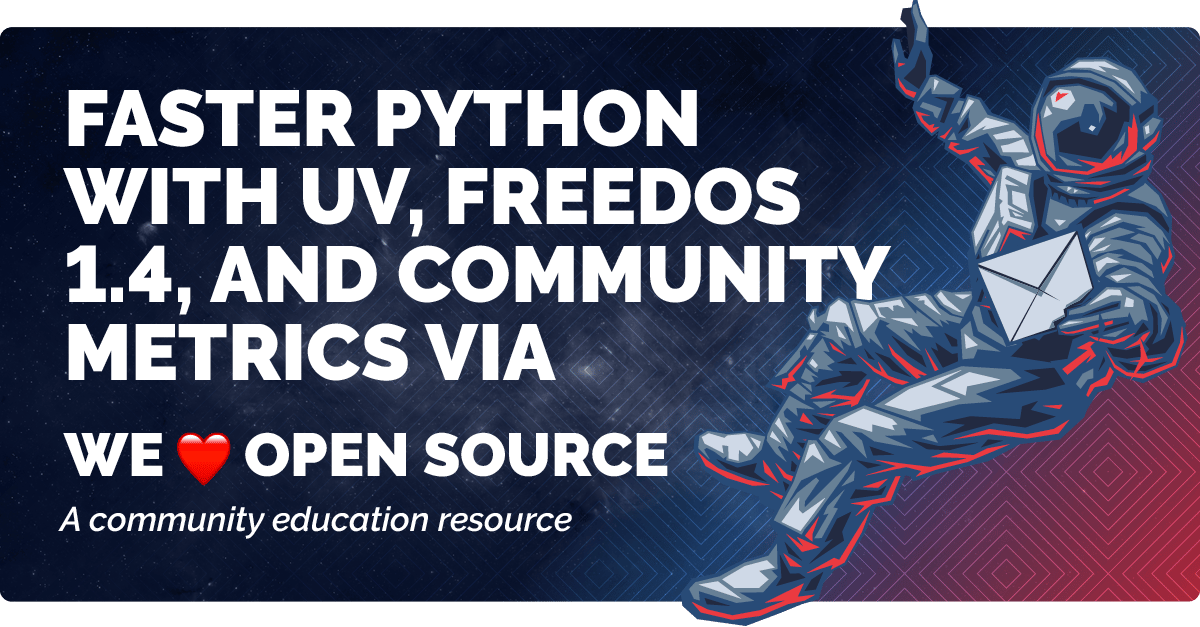- We ❤️ Open Source
- Posts
- Faster Python with uv, FreeDOS 1.4, and community metrics via Savannah
Faster Python with uv, FreeDOS 1.4, and community metrics via Savannah

Welcome to the 12th edition of the We ❤️ Open Source newsletter!
Our goal is simple - to increase your open source IQ and introduce you to the people making open source possible in the process. Who you know and what you know, will get you to where you want to go. 🙂
We're covering some really cool topics this week:
If all or any of this sounds good, let's get into it!
Savannah is an open source Community Relationship Manager (CoRM) that helps track community health across repositories and discussion platforms. Alan Pope introduces us to it in this excellent article. WHY WE ❤️ IT: Open source community health is vital, and Savannah is brilliant for identifying new contributors, spotting disengagement early, and measuring the impact of your community efforts. This quick read is immensely helpful if you’re interested in why this matters and how it works. |
Ebony Louis, Developer Advocate at Block, helps us explore "From Netflix to robots: How AI learns, improves, and sometimes fails—depending on its data". WHY WE ❤️ IT: This article answers the question "If AI isn’t programmed with strict rules to follow, then how does it actually learn?". That's where Machine Learning (ML) comes in, as you'll see in this extremely educational post. |
The great Jim Hall takes a look at the FreeDOS 1.4 release in this post and finds it adds game-ready sound emulators, image tools, and system fixes—perfect for playing your favorite DOS classics. WHY WE ❤️ IT: Did you know FreeDOS is also one of the oldest open source projects still around? FreeDOS recently celebrated its 30th anniversary, and it's still going strong with the 1.4 release from earlier in April. Pretty cool if you ask us. |
In our ongoing look at developer marketing (a fascinating topic to us), Jen Wike Huger explains the key roles social media plays in developer engagement. WHY WE ❤️ IT: As the social lead for Docker, Jen brings a unique perspective and tried-and-true lessons learned to this topic, ones many can benefit from. Connecting with developers on social media is important, but it's vital to keep in mind developers engage differently if you're going to be successful. |
Don Watkins takes us on his recent journey installing Linux on a restored HP Pavilion with BIOS issues and an encrypted drive. The laptop was a gift from a friend. WHY WE ❤️ IT: For hardware and tech geeks of all kinds, this article is pure catnip. The journey begins when Don noticed CMOS battery errors from the BIOS and decided to take the computer apart. It only gets better from there. |
This podcast summary post introduces us to the Open Compute Project, a global collaborative community focused on advancing data center hardware. WHY WE ❤️ IT: 400+ companies are currently collaborating on open hardware for data centers. This article and accompanying podcast take a look at why. |
What's in your technology toolbox?
William Hill, Developer Advocate at NVIDIA, is always looking for open source tools to boost developer productivity. In this article he introduces us to uv and demonstrates how it can assuage some of the complexities of dependency and environment setup, and make coding in Python that much more enjoyable.
From the We ❤️ Open Source Podcast
In this engaging conversation, Brandon Mathis highlights useful tools like GitHub Copilot, ChatGPT, and Exercism, and offers perspective on the evolving state of JavaScript. He also shares hard-earned advice on building a successful career in tech, something we all can benefit from. |
Wrap Up
If you've made it this far, be sure to check out our latest events email, our June 10 RTP meetup focusing on Agentic AI (we'll be live streaming), and our YouTube channel where you can watch thousands of open source talks.
We hope you learn something new this weekend!
How did you like the newsletter? |







